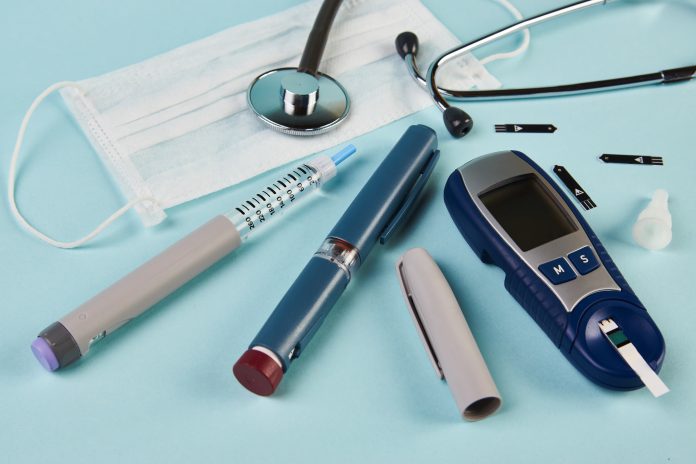Olivia Burr, Inpatient Care Lead at Diabetes UK, explains how COVID-19 has renewed momentum to improve inpatient diabetes care
In March 2020, the COVID-19 pandemic presented the National Health Service with extraordinary challenges, with routine appointments cancelled, healthcare teams redeployed, and staff brought out of retirement to contribute to the national effort.
COVID-19 has impacted all forms of care delivery across the UK, and in the aftermath of the first wave of the pandemic, Diabetes UK sought to understand how inpatient care for people with diabetes has been affected. Throughout August 2020, we interviewed 28 healthcare professionals and hospital teams across the UK about their experiences of delivering inpatient care during the first peak of the pandemic, with the results published in Inpatient Diabetes Care during the COVID-19 Pandemic.
Learnings from the pandemic
Some structural changes were beneficial
During the first wave, the report found considerable variation in the quality of inpatient diabetes care across the UK. In some cases, inpatient teams were disbanded, with diabetes specialist nurses redeployed to provide general ward care across hospitals. This led to the perception among those interviewed that inpatient diabetes care was compromised, with clinicians feeling less able to deliver high quality and safe diabetes care. In these hospitals, we urge that diabetes teams are retained to ensure the care for people with diabetes is not compromised.
Across the country, many teams adapted and reorganised their inpatient services to deal with demand. Surprisingly, in some cases, disruption to inpatient diabetes services created positive environments and opportunities for new ways of working. For example, some diabetes inpatient care teams were able to expand to weekend working as they benefited from having additional staff members – who had been released from their diabetes outpatient duties – join their teams, leading to a greater presence of diabetes specialists. Teams also proactively sought out people with diabetes for bedside reviews and took action to stop unnecessary admissions. Working with increased flexibility and resource allowed teams to respond rapidly and effectively.
Tech proved indispensable
Certain technologies, like web-linked glucometers, electronic patient records and prescribing, online referral systems, and video conferencing proved vital to providing inpatient diabetes care during the first wave of the pandemic. Healthcare professionals were able to rapidly identify people with diabetes, which, in turn, increased the number of those reviewed, and improved patient flow from admission to discharge.
Staff who were self-isolating or shielding could also provide inpatient care remotely, which further reduced potential disruption.
Inpatient diabetes teams felt valued
Those interviewed also reported a heightened visibility and awareness of diabetes teams within the wider hospital. Many felt a sense of recognition among colleagues of their key role in helping maintain patient safety and flow through the hospital system. The need for expert diabetes care was elevated by the glucose metabolism-altering effects of COVID-19, and the effects of dexamethasone and other drugs that are given to people with COVID-19 on glucose levels meant specialists had a unique role to play.
Although there were cases where inpatient teams were redeployed or disbanded, leading to some negative effects on care provision, almost all healthcare professionals interviewed spoke of a refreshed momentum and new opportunities to improve diabetes inpatient care.
Making hospitals safe for people with diabetes
Since 2018, Diabetes UK has been calling for every hospital stay for people with diabetes to be safe. Our Making Hospitals Safe report called for multidisciplinary diabetes inpatient teams, strong clinical leadership, better support for people to take ownership of their diabetes, and better access to technology and systems.
Our 2020 report into inpatient care during the COVID-19 pandemic found that services that were already delivering care in line with our 2018 recommendations – by employing strong clinical leadership with better access to technology – described more positive experiences and felt they could provide a higher standard of care.
Recommendations
It is vital to explore how the benefits seen during the first wave can be sustained to help minimise the variations in care highlighted in the Getting it Right First Time report. We need both a short and long-term response to ensure that teams are equipped to deliver sustained high-quality diabetes care, despite the unpredictable nature of the pandemic.
In preparation for the months ahead, hospitals and local health systems must urgently take up the following recommendations:
• All hospitals must have a dedicated multi-disciplinary team of specialist diabetes inpatient practitioners as indicated in the NHS Long Term Plan. These teams must be retained to ensure that care for people with diabetes is not compromised.
• Diabetes inpatient teams must be deployed effectively to maximise their value and provide safe, effective care for people with diabetes.
• Technology such as web-linked glucometers, ketone meters, electronic patient records and inpatient diabetes dashboards and video call equipment must be available in hospitals.
• Hospitals and local health systems must ensure appropriate support and protection for staff physical and mental wellbeing.
• The NHS Long Term Plan commitments to ensure universal coverage of diabetes inpatient specialist nurse teams must be urgently actioned.
Refreshed momentum for improving diabetes inpatient care
Despite the challenges of providing care during the COVID-19 pandemic, those interviewed described a revelatory opportunity to deliver inpatient services in ways they had always sought to. Healthcare professionals are determined to retain these new-found ways of working and to ensure that diabetes inpatient care remains recognised and prioritised. It is now vital we harness the refreshed momentum for positive change and embrace new opportunities and insights to improve diabetes inpatient care delivery across the UK.











